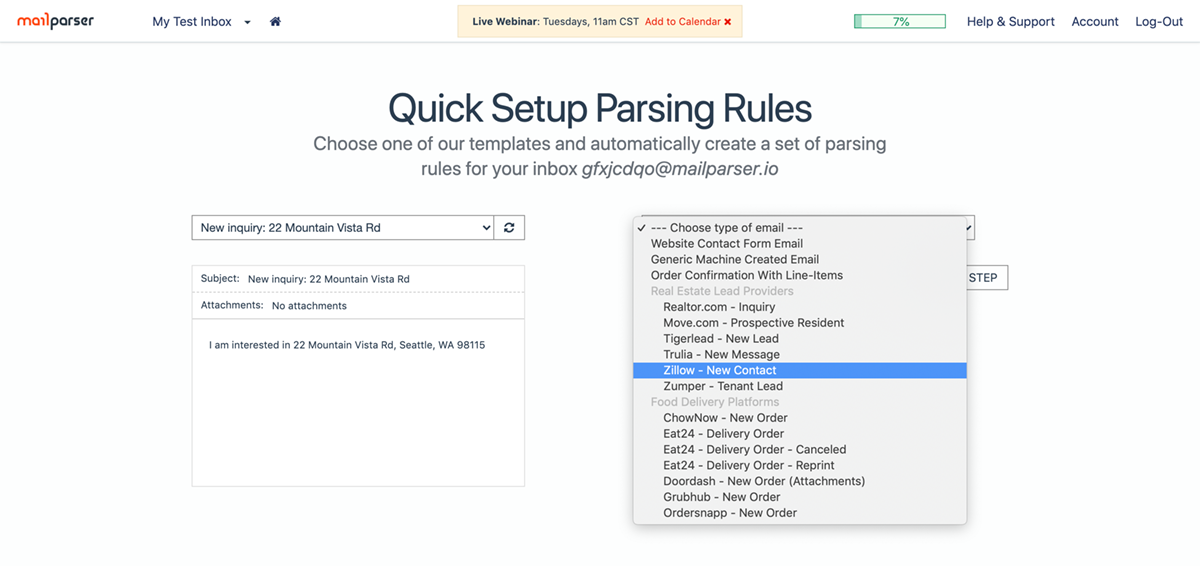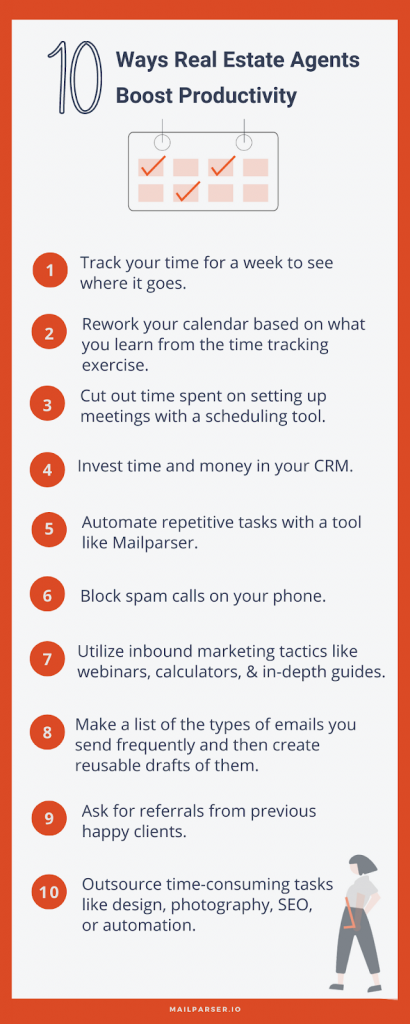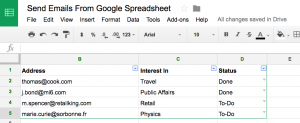The real estate business is notoriously busy, and whether you’re representing buyers or sellers, expectations from clients are at an all-time high. The secret of top-ranking realtors isn’t just that they’re more productive. It’s that they only focus on tasks that maximize delivering results.
Productivity in the real estate industry isn’t about booking more listings or showings. It’s about taking a deep look at all of your processes and systems and figuring out which are helping your business and which are just keeping you busy.
When you look at it from that lens, productivity is just a measure of how much value you get from the time you put towards a specific task. And when it comes to the real estate business, that value is easily measured by whether a task gets you closer to closing a deal and getting paid.
Three tips for real estate agents to boost productivity

1. Track your time for a week to understand where it goes.
Human beings are notoriously bad at estimating — especially when it comes to focus time. We all tend to underestimate how long something will take when we’re anticipating it and overestimate how much time we spend once we’re done. Trying to recreate how long a business task takes from memory, is like looking in a funhouse mirror — the reflection is distorted.
That’s why time management expert, Laura Vanderkam, recommends tracking your time for an entire week. For real estate agents, we’d add to that recommendation by saying you shouldn’t just track “work” — you need to break things into categories like:
- Communicating with clients
- Marketing/Lead generation
- Data management
- Paperwork/contracts
- Showings
- Open houses
- Setting up a listing
- Etc.
2. Do a remodel on your calendar based on insights from your time tracking exercise.
Multitasking has been shown to reduce productivity because our brains aren’t very good at switching between things — we lose time every time we switch back and forth, and we don’t do either task as effectively.
That’s bad news for realtors because the nature of client demands tends to encourage multitasking. But there are still ways you can take control of your time and your calendar.
Creating some general time blocks that you can then fill is the best way to start. If you’re in residential real estate, and you’re a buyer’s agent, showings will be a priority, and chances are you do a lot of these on evenings and weekends. Block those times on your calendar each week for showings, and then block the time before and after them for any quick admin work you need to do, like printing out listings, adding notes to your CRM, etc.
Communicating with clients is also a necessity, but you don’t need to check email every 5 minutes all day. Create 20-30 minute blocks of time 2-3 times a day to return emails, respond to voicemails, etc.
Chunking your time like this will go a long way towards making you feel more focused and more productive.
3. Reduce the time you spend scheduling meetings (to zero).
Communicating about scheduling is a massive time-waster in any office, but in a real estate office where you’re scheduling with clients, partners, internal staff, networking meetings, etc., etc., etc., it can add up even faster than in other industries.
The good news is that you don’t need 10 emails to schedule a single meeting anymore. Now that you’ve organized your calendar into blocks of time when you do certain types of tasks, you can use that to line up to a scheduling tool in your CRM. (Hubspot is a CRM that’s highly rated by the real estate industry that can manage your calendar), or you can use a separate app, like youcanbook.me.)
Whatever app you use, the process is the same. When someone, like a new client, wants to book time on your calendar, you send them a link, and they can see all the available times you’ve set, choose one that works for them, and book it.
Bonus tip: If you have a lot of meetings or a lot of different types of appointments, it’s worth taking the time to create different booking links by category with a default length of time and specific openings on your calendar that line up with the time you blocked for that category.
Make sure your tech stack is working for you

4. Invest time (and money) in your CRM.
A Customer Relationship Management system is like the heart of your business — if it’s not healthy and running properly, it can have a significant impact on the rest of your work. If you’re relying on email and memory to manage and qualify leads, you might as well still be storing your listings in a binder or using a Rolodex. Having a CRM that works for you means you can categorize leads, find your most qualified leads, and follow up faster.
If data management isn’t your thing, it’s well worth it to hire a consultant to help set up and organize your system and do some maintenance from time to time.
5. Set aside some time to automate repetitive tasks (no computer science degree required).
This is one of the biggest lessons in boosting productivity for real estate agents and brokers.
If you do a task on a computer repeatedly, chances are you can easily automate it. So make a list of these things. For example, do you copy leads coming into your email from multiple sources — like Zillow, Trulia and Realtor.com —and then paste the info into fields in your CRM or a spreadsheet?
Today you don’t need a degree in computer science to automate tasks simply. You could save hundreds, if not thousands of hours over the long term (hello productivity!). For example, with Mailparser you could extract recurring data fields from your emails and move them to an end point of your choice, like your CRM for instance. It’s as simple as forwarding an email and setting up a few point-and-click rules. If you’re getting leads from systems like Zillow or Realtor.com, there’s even a quick set up option.

By setting up a free account now, you can have it working for you in minutes. Then add some quick auto-forwarding rules to your inbox, and you’ll never have to copy and paste leads out of your email again.
GET A FREE MAILPARSER ACCOUNT
6. Get smart about blocking SPAM calls on your cell phone.
As a realtor, you can’t ignore your phone, but with a record 3.3 billion robocalls received in the U.S. in June 2020 alone, it’s a safe bet that not all of your calls are from clients, potential clients, or even real humans.
Shelling out a few bucks to a good call filtering app is worth it for real estate agents and will cut the clutter from your phone log so you can have more confidence that answering a call will be a good use of your time.
In the U.S., major carriers Verizon and AT&T both offer free and paid apps to cut down on robocalls, and there are also several 3rd party apps like Robokiller and Hiya that work with any cell provider for iPhone or Android users.

Make your marketing campaigns more productive.
7. Understand how to use inbound marketing.
If you’re only marketing in traditional ways through advertising, social media, and other “outbound” methods, you’re putting a lot of effort into reaching a wide audience that isn’t necessarily well-targeted. (Marketers often refer to this strategy as “spray and pray.”)
Inbound marketing is more like baiting a hook than casting a net. It means creating content and events that people who would be good targets for your services want, advertising and promoting that content, and letting the leads come to you.
For realtors this means things like calculators (“How much home can I afford?”), webinars and in-depth guides on types of mortgages and the home-buying or home-selling process that people can download in exchange for their email address, as well as other types of lead magnets. With inbound marketing, once you have people in your funnel, you have a better sense of exactly what topic they’re interested in and you can set up an email follow-up campaign to further qualify them.
8. Have one-click emails at the ready.
Clients are unique, and you can’t take a one-size-fits-all approach, but you can look for patterns in the types of email you send over and over and save yourself a lot of time by either setting those up in a CRM like hubspot, or just saving a draft in your email program that you can copy/paste and send instead of typing the same info over and over again.
Things like links to local listings, a mortgage calculator, and local lenders you recommend might be an example of an email a buyer’s agent should have on hand for clients early in the home-buying process. A list of inspectors, testing companies, and contractors would be another for clients in the offer & negotiation stage. Take a few minutes to jot down the types of emails you send frequently, and then set aside an hour or two to create reusable drafts of them.
9. Nurture leads you’ve already developed.
Your best clients often come through referrals from previous happy clients. But while this channel (and you should think of it and track it as a marketing channel!) can have amazing returns, it’s often neglected and taken for granted.
Follow up with clients a few months after a deal closes and see how they’re liking their new home or commercial space, thank them for their business, and ask for referrals.
If a past client gives you a great referral, follow up with a thank you and a gift like a bottle of wine, or a gift certificate to your favorite local restaurant. They’ll remember the gesture when someone asks if they know a good realtor.
And our final tip for a more productive real estate business?
10. Outsourcing is your best friend.

The most productive people in any industry understand the value of outsourcing, and real estate is no different. Your time has value, and you should be using it for the things that no one else can do as well as you. Everything else? Outsource it.
If you do something over and over that someone else could do for you, write down a process or make a checklist, and delegate it. If you’re not great at something that needs to happen in your business, like design, photography, SEO, or automation — outsource it.
And this tip can go beyond your business. Realtors and Brokers often wind up working evenings and weekends. Take a look at your home life and look for any tasks that tend to wind up as stressors. Grocery and meal delivery, dog walking, and laundry services are all pretty affordable and widely available services that can make a massive difference in your stress levels.

Conclusion: 10 Ways top-ranking Real Estate Agents Boost Productivity
Getting more productive ironically takes a little time, but if you start by taking a step back and looking at how you spend your time, categorizing it, automating everything you can, making sure your marketing works for you, and then taking the same approach with your life at home, we can just about guarantee you’ll close more deals in less time, with less stress. And that’s what productivity is really about.
We’re also here to help you check off a lot of these steps. If you’d like to organize leads from Zillow, Trulia, Realtor.com, and other MLS-apps, or pulling any other types of data out of your email, start a free Mailparser account, or hit the chat button on the right and we’ll get right back to you.


